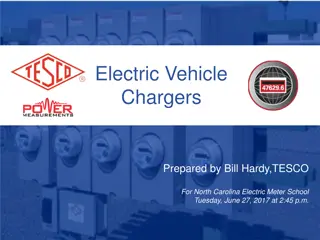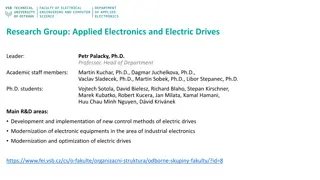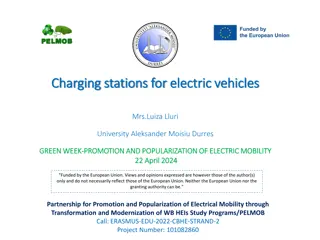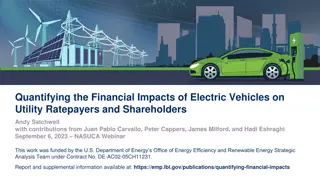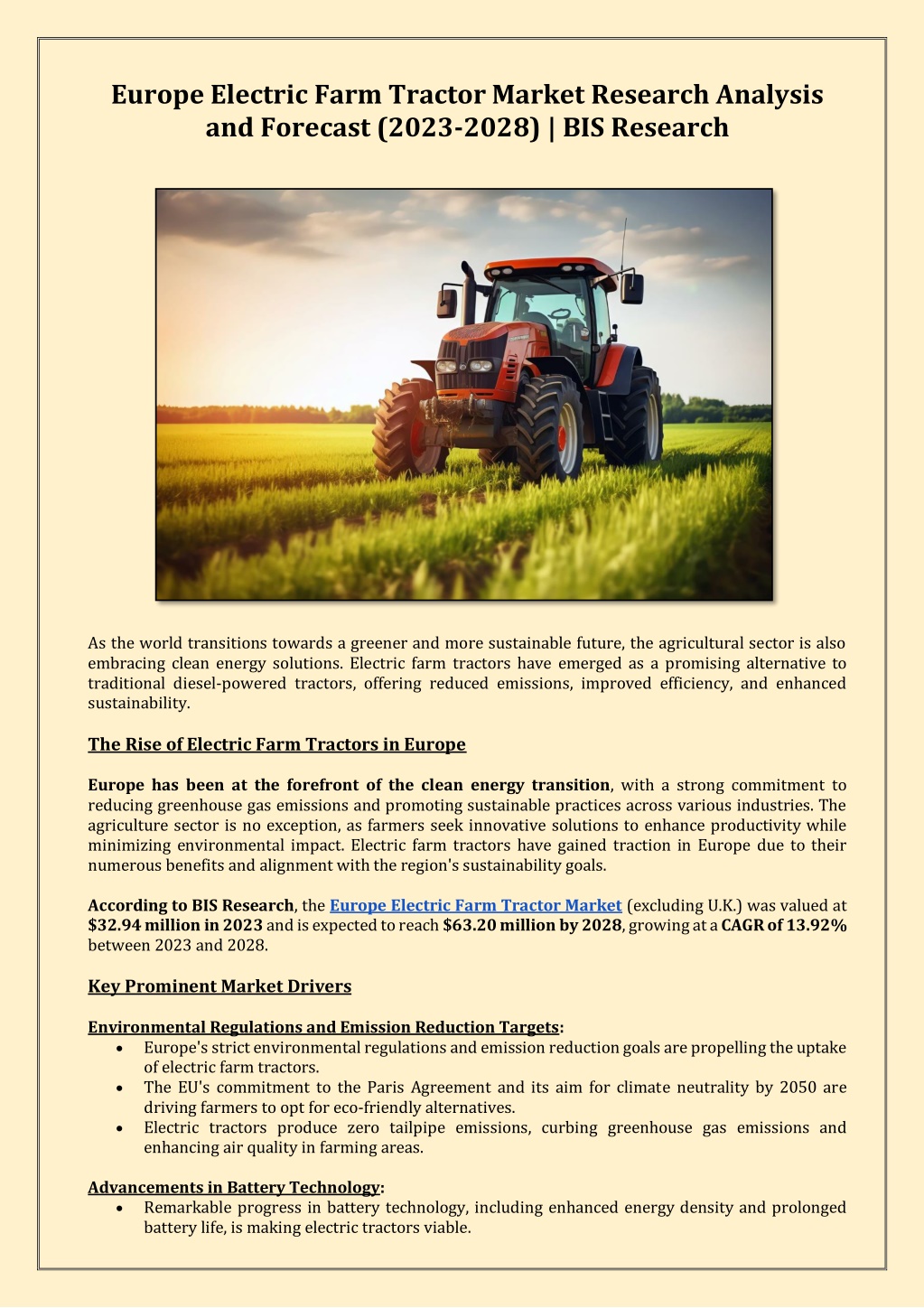
Europe Electric Farm Tractor Market Research Analysis and Forecast (2023-2028)
According to BIS Research, the Europe Electric Farm Tractor Market (excluding U.K.) was valued at $32.94 million in 2023 and is expected to reach $63.20 million by 2028, growing at a CAGR of 13.92% between 2023 and 2028.
- Europe Electric Farm Tractor Market
- Europe Electric Farm Tractor Industry
- Europe Electric Farm Tractor Market Report
- Europe Electric Farm Tractor Market Research
- Europe Electric Farm Tractor Industry Analysis
- Europe Electric Farm Tractor Market CAGR
- BIS Research
- Agriculture
Uploaded on | 3 Views
Download Presentation
Please find below an Image/Link to download the presentation.
The content on the website is provided AS IS for your information and personal use only. It may not be sold, licensed, or shared on other websites without obtaining consent from the author. Download presentation by click this link. If you encounter any issues during the download, it is possible that the publisher has removed the file from their server.
Presentation Transcript
Europe Electric Farm Tractor Market Research Analysis and Forecast (2023-2028) | BIS Research As the world transitions towards a greener and more sustainable future, the agricultural sector is also embracing clean energy solutions. Electric farm tractors have emerged as a promising alternative to traditional diesel-powered tractors, offering reduced emissions, improved efficiency, and enhanced sustainability. The Rise of Electric Farm Tractors in Europe Europe has been at the forefront of the clean energy transition, with a strong commitment to reducing greenhouse gas emissions and promoting sustainable practices across various industries. The agriculture sector is no exception, as farmers seek innovative solutions to enhance productivity while minimizing environmental impact. Electric farm tractors have gained traction in Europe due to their numerous benefits and alignment with the region's sustainability goals. According to BIS Research, the Europe Electric Farm Tractor Market (excluding U.K.) was valued at $32.94 million in 2023 and is expected to reach $63.20 million by 2028, growing at a CAGR of 13.92% between 2023 and 2028. Key Prominent Market Drivers Environmental Regulations and Emission Reduction Targets: Europe's strict environmental regulations and emission reduction goals are propelling the uptake of electric farm tractors. The EU's commitment to the Paris Agreement and its aim for climate neutrality by 2050 are driving farmers to opt for eco-friendly alternatives. Electric tractors produce zero tailpipe emissions, curbing greenhouse gas emissions and enhancing air quality in farming areas. Advancements in Battery Technology: Remarkable progress in battery technology, including enhanced energy density and prolonged battery life, is making electric tractors viable.
These advancements extend the range and operational capabilities of electric tractors, enabling them to handle various agricultural tasks. Improved battery tech reduces charging downtime, ensuring seamless farm operations. Cost Savings and Operational Efficiency: Electric tractors promise potential cost savings compared to diesel counterparts, despite higher upfront expenses. They entail lower operating and maintenance costs, with fewer moving components and no need for diesel fuel. As renewable energy prices drop, the expense of powering electric tractors continues to diminish, enhancing their economic appeal. Government Incentives and Support: European governments are offering incentives and aid to expedite electric farm tractor adoption. Subsidies, tax breaks, and funding initiatives encourage farmers to invest in electric tractors, making the transition financially viable. Government assistance includes building charging infrastructure, providing R&D grants, and conducting awareness campaigns to promote electric tractor benefits in agriculture. Access More: Request A Free Detailed Sample on Europe Electric Farm Tractor Market Research Report. Market Outlook and Challenges The Europe Electric Farm Tractor Market is poised for significant growth in the coming years. As technology continues to advance, electric tractors are expected to become more powerful, efficient, and cost-effective. However, some challenges need to be addressed for widespread adoption. These challenges include the limited range of electric tractors compared to diesel tractors, the availability of charging infrastructure in rural areas, and the need for standardization in battery technology and charging protocols. Benefits of Electric Farm Tractors Reduced Environmental Impact: Electric tractors produce zero direct emissions, contributing to cleaner air and reduced carbon footprint. They help mitigate climate change, improve soil health, and protect biodiversity in agricultural landscapes. Improved Energy Efficiency: Electric tractors are more energy-efficient compared to diesel tractors. They convert a higher percentage of energy into useful work, reducing energy waste and improving overall operational efficiency. Noise Reduction: Electric tractors operate quietly, reducing noise pollution in rural areas and improving the working environment for farmers and nearby communities. Enhanced Precision and Connectivity: Electric tractors can be integrated with precision agriculture technologies, such as GPS and data analytics, enabling farmers to optimize field operations, monitor crop health, and implement targeted farming practices. Conclusion The Europe Electric Farm Tractor Industry represents a significant opportunity for sustainable agriculture and the reduction of greenhouse gas emissions. As Europe strives to achieve its climate goals, electric tractors are poised to play a crucial role in transforming the agricultural sector. With supportive policies, technological advancements, and increasing awareness of the benefits, electric tractors are set to revolutionize farming practices, ensuring a greener and more sustainable future for European agriculture.

